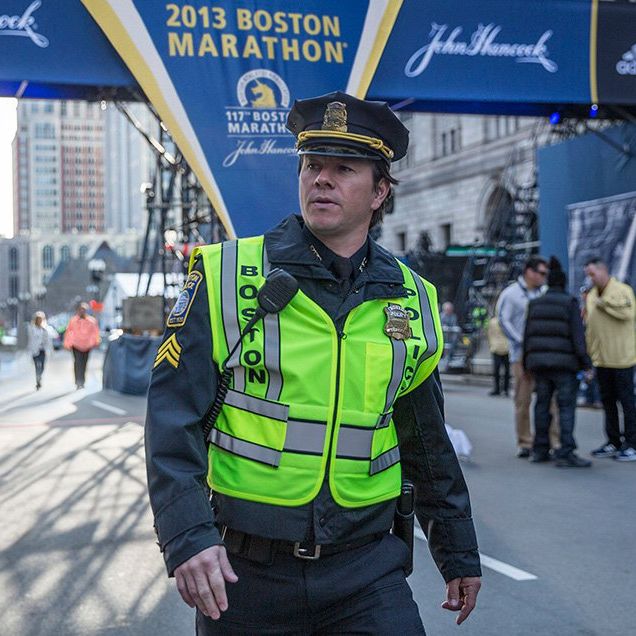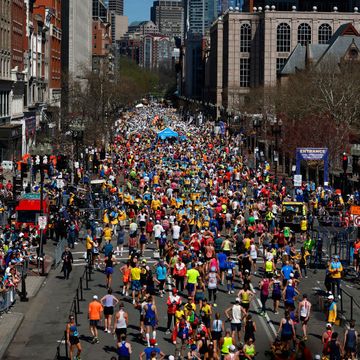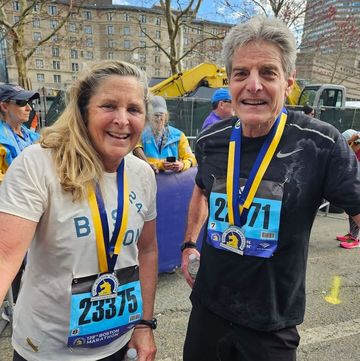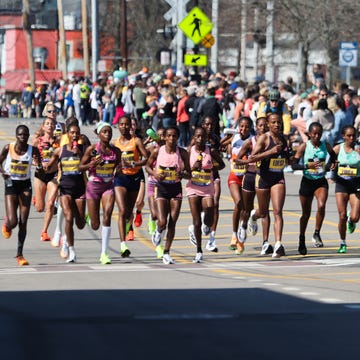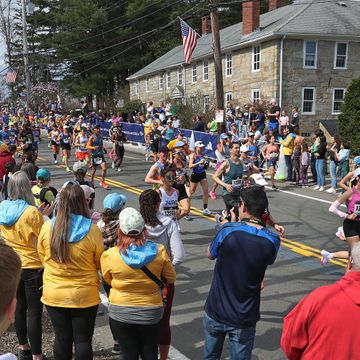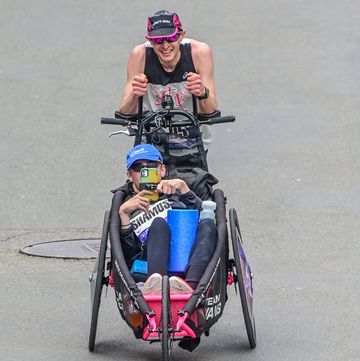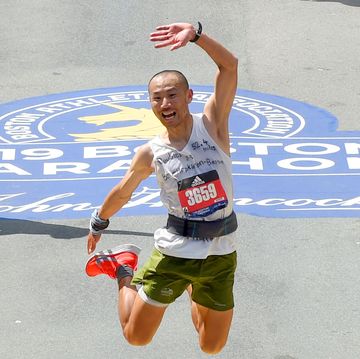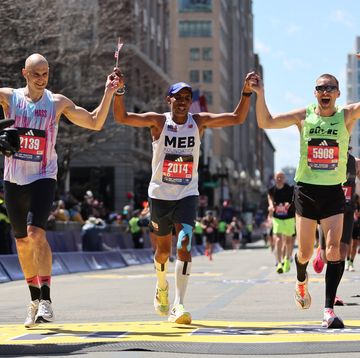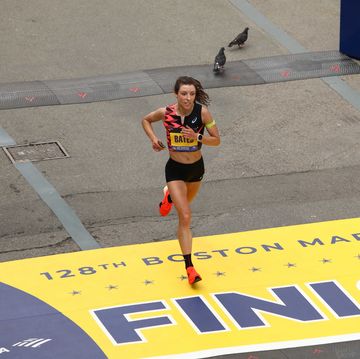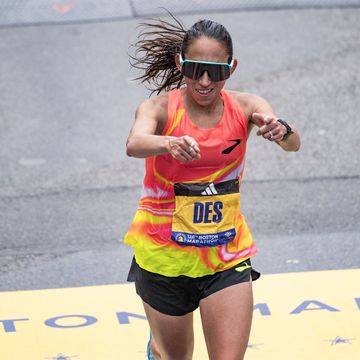Dave McGillivray stood on the sidewalk in Boston’s Theater District by himself for some brief moments and took in the scenes around him.
With hands in his pockets on a chilly December night, the longtime race director of the Boston Marathon positioned himself outside of the fray and watched as others joined the red carpet festivities for the premiere of Patriots Day, the new major motion picture chronicling the marathon bombings and the manhunt that took over a city in 2013.
A native of Medford, Massachusetts, located just a few miles outside of Boston, McGillivray has loved planning the historic 26.2-mile course so much that he runs it himself once the top finishers have long started their recovery. It took him a moment to find the correct words and emotions to sum up what it was like to rehash the events of 2013 as he watched the hustle and bustle of Hollywood do its thing.
“It’s very emotional,” McGillivray told Runner’s World before Wednesday night’s premiere at the Boch Center’s Wang Theater, “to have that all come back a bit was tough.”
McGillivray’s emotions are not unlike the ones many Bostonians have. There is a general curiosity to see how the moviemakers told the story, yet uneasiness about how sensitive Hollywood was going to be with the acts of terror that changed one of the most cherished events in the city.
“I think they did it in a respectful and credible way,” said McGillivray, who saw the film at a private screening for Boston Athletic Association (B.A.A.) staff and officials before seeing it a second time at the official screening. “It was a story that was going to be told some time by someone. I think it’s important (it was done by) someone who grew up here in Boston and was sensitive to everything that had gone on.”
The challenge of telling the story fell on Mark Wahlberg, a Dorchester native, and Peter Berg, who directed other biopic films such as Lone Survivor and Deepwater Horizon.
Wahlberg has taken this project on as a personal mission of sorts. Originally there were going to be three movies made about the Boston Marathon bombings. Berg’s original script was supposed to be accompanied by a film based on Boston Strong—a book authored by Casey Sherman and Dave Wedge as an account of the bombings and the manhunt that ensued through the eyes of first responders and survivors—and Stronger—a movie about survivor Jeff Bauman showing his perseverance to fight on after he sustained life changing injuries at the 2013 Boston Marathon.
CBS purchased the script to Boston Strong in 2015, and Berg worked in some of that storyline to his original screenplay to create the version of Patriots Day. The movie will premiere in select cities later in December and nationwide January 13.
Wahlberg has worked the national media circuit promoting the film and has kept his mood more serious and somber knowing the subject matter of the movie. Before Wednesday’s showing, with members of the Boston Police Department, Watertown Police Department, first responders, and survivors of the blasts hanging on his words, he told the crowd why it was important he made this movie.
“I decided to make it because of the pride I felt to be a Bostonian and seeing how my people responded in the face of this horrific tragedy,” Wahlberg said. “It is an honor to call myself a Bostonian and to call you guys my family.”
The story follows Wahlberg’s composite character, Tommy Saunders, a Boston Police sergeant who is working the finish line at the Boston Marathon on April 15, 2013. The majority of the movie is based on what happens after the bombings, when the city was shut down and local police and the FBI scoured the streets for the two Tsarnaev brothers who attacked the marathon. Several key players who helped the manhunt in the days that followed the attack are depicted in the film with their names and titles, including Boston Police Commissioner Bill Evans (James Colby) and former Commissioner Ed Davis (John Goodman).
The early scenes of the two bombs at the finish line were raw and very real. The first explosion sent a definite hush through the packed theater, and the second sent all those feelings and emotions pouring back into an event that still has an effect on so many.
“It’s sensitive and individualized as to people’s reactions to what happened in 2013. To one degree or the other I felt the need to go to simply be familiar with it,” said Tom Grilk, executive director of the B.A.A. “The people who worked on the film came to us a long time ago and assured us that they intended to display the appropriate sensitivity and to display the strength and resilience of the community here.”
Three lives were lost during the bombings on Boylston Street. MIT police officer Sean Collier, whose story was also told in the movie, was the fourth person to lose his life in the attacks during the manhunt. Hundreds more were scarred and changed forever. In Boston, everyone knows someone who knows someone who was directly affected.
“It’s a little tough seeing the movie and seeing some instances where you were so deeply involved in,” said Dic Donohue, a former MBTA Transit Police officer who was critically injured in the Watertown shootout. “Seeing a friend of mine (Collier) on screen and the sacrifice he gave and remembering how serious it was. There was a terrorist attack on one of the most important days that the city of Boston has on Patriots Day.”
Walking around the lobby of the theater on Wednesday, it almost had the feel of a reunion. Police officers and officials were gathering with one another. Survivors were hanging together, taking photos and also catching up on their recovery and life in general. Jessica Kensky, whose story with husband Patrick Downes was the main survivor story told in Patriots Day, said she didn’t hear a lot of negative reactions from people who were tied so closely to the film.
“It’s obviously never going to feel good. I think it brought up a lot of stuff and it was hard to see the bombers on screen so much,” Kensky said. “That was the most common thing I heard.” (Watch a special feature courtesy of Lionsgate/CBS Films of Kensky and Downes, along with the actors who portray them, discussing the movie.)
Downes, who became the first Boston bombing amputee to complete the race in 2016 (with his wife there to hug him afterward), agreed and thinks that it will take time for the movie to set in for anyone who sees it.
“For our Boylston Street family there are so many emotions caught up in it,” Downes said, “because it’s so personal to them.”
